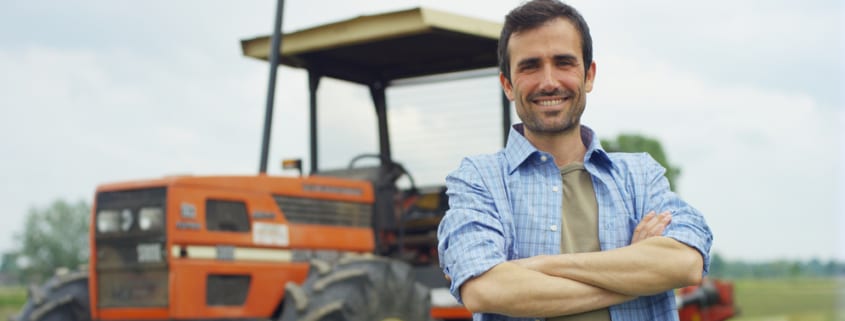At High Grade, we wanted to know how hemp farmers were faring in the midst of a rapidly changing industry wrapped up in one of the most unpredictable years on record. We also touched base with non-hemp farmers to learn about their struggles and triumphs. After surveying over 125 farmers, here’s what we found.
Key Takeaways:
- 59% of hemp farmers are between the ages of 31 and 50 years old.
- 61% of hemp farmers have been farming hemp for five years or less.
- 41% of hemp farmers consider themselves “subsistence farmers,” while an identical 41% of hemp farmers categorize themselves as “commercial farmers.”
- 39% of farmers (hemp farmers and non-hemp farmers) with over 10 years of experience claim finding labor is the most challenging part of managing a farm.
- 54% of farmers (hemp and non-hemp farmers) claim they do not use modern technologies on their farm.
- Just under 30% of hemp farmers were able to earn over $5,000 per acre.
- Only 17% of non-hemp farmers claimed to make over $5,000 per acre.
- Hemp farmers, on average, dedicate just over half of their acreage to planting hemp.
About the Survey
We used Survey Monkey to survey over 125 farmers (ranging in age, experience, income, and acreage) across the country. Of the farmers we surveyed, just over 35% of respondents farmed hemp, while more than 57% of respondents claimed they were considering farming hemp. The majority of total respondents were between 41 and 60, though 24% were between the ages of 31 and 40. Over half of the respondents had been farming for five years or less; just over 60% of respondents considered themselves subsistence farmers.
Overall, the responses we received were fascinating and have provided us with an important glimpse into the state of both hemp farming and non-hemp farming. Here is a deeper dive into some of the results that really caught our eye.
Profitability of Hemp vs. Other Crops
Hemp is one of the hottest cash crops in the country, especially hemp grown for CBD or CBG. Some reports claim that farmers can earn $30,000 or more per acre by farming hemp for CBD or CBG. Our survey results don’t exactly bear out these Pollyanna claims, but they do seem to indicate that hemp can be more profitable than many other crops.
Our survey found that nearly 30% of hemp farmers were able to earn more than $5,000 per acre. Compare that with just 17% of non-hemp farmers who could make the same claim. Please note that our survey did not distinguish between hemp farmers who grew hemp for fiber, seed, or cannabinoids, so the earnings per acre may be affected by which crop hemp farmers harvest.
The bottom line is that while more farmers are earning over $5,000 per acre farming hemp than other crops, the majority of hemp farmers (over 70%) are earning less than $5,000 per acre. New farmers dreaming of raking in $30,000 per acre need to re-evaluate their expectations.
With that said, hemp profitability is possible. Here are 10 hemp farming tips for increasing profits.
The Biggest Challenges in Farming
Farmers face all sorts of challenges, from uncertain weather to expensive equipment, government regulations, and more. But what are the biggest challenges farmers face? We set this question to our survey respondents, and they told us that the two most difficult things to manage on the farm were selling the harvest (21%) and finding/managing labor (21%).
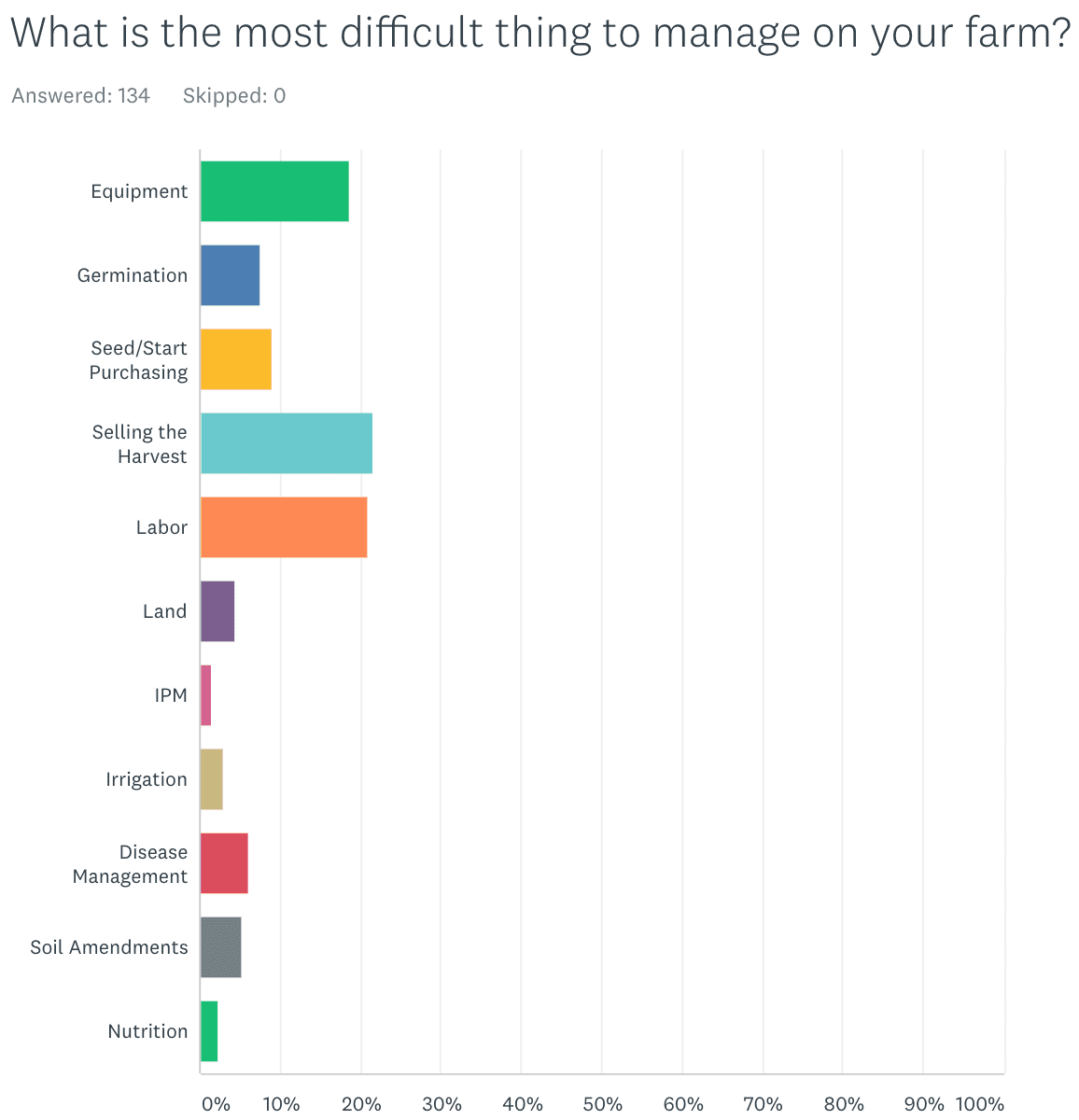 Though these responses included farmers of every stripe, selling the harvest and managing labor are two challenges we hear about a lot in the hemp community. Hemp was only broadly legalized in the 2018 Farm Bill, so the selling infrastructure is being built while farmers are learning how to grow hemp in their fields. Currently, there are no hemp silos where farmers can drop off their crops. Take a look at one of our latest blog posts about how to sell hemp biomass.
Though these responses included farmers of every stripe, selling the harvest and managing labor are two challenges we hear about a lot in the hemp community. Hemp was only broadly legalized in the 2018 Farm Bill, so the selling infrastructure is being built while farmers are learning how to grow hemp in their fields. Currently, there are no hemp silos where farmers can drop off their crops. Take a look at one of our latest blog posts about how to sell hemp biomass.
Likewise, farmers looking to grow hemp flower must harvest the buds by hand. This often requires a high level of labor, which can be difficult when workers are few and far between.
Is Farming Becoming More Competitive?
For the most part, answers to our survey ran the gamut. After all, farmers are not a monolithic population. They’ve got all sorts of opinions. One question, however, seemed to unite nearly all of our respondents. We asked whether farming was becoming more competitive or less competitive. A whopping 88% of respondents told us that farming was becoming more competitive.
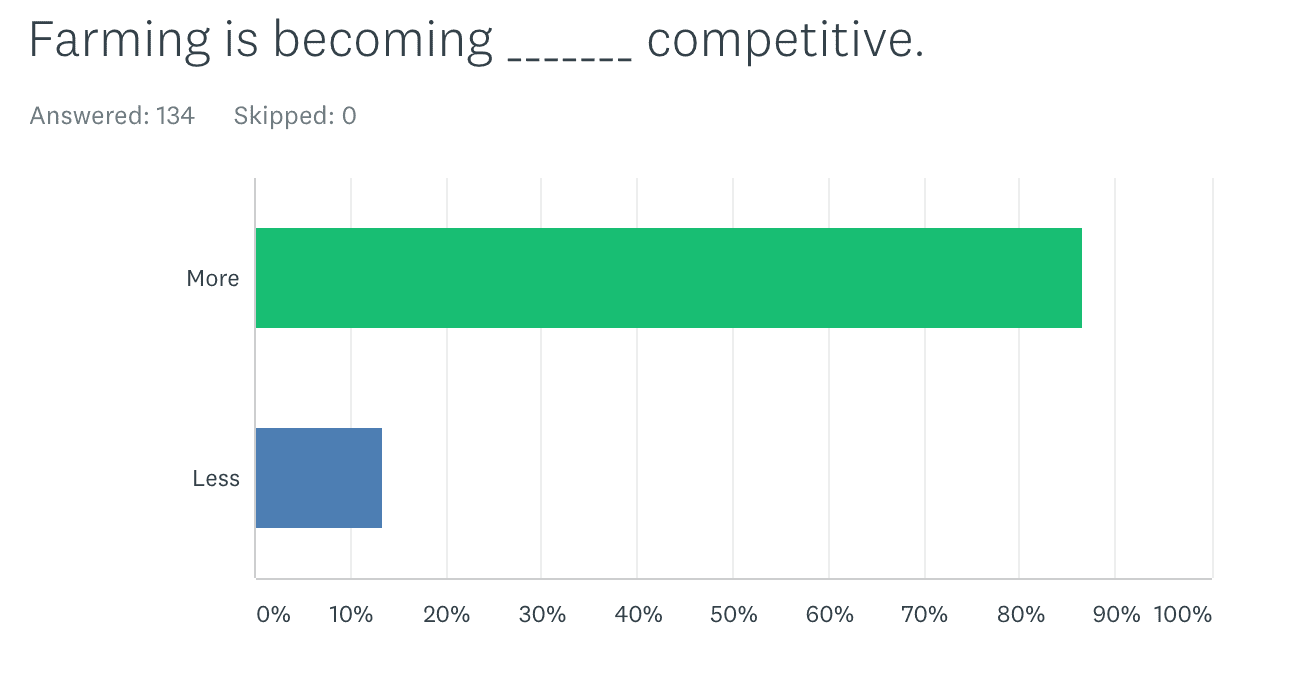
In a world where margins are pinched and profits are harder to come by, farmers need to focus on using best practices. For hemp farming, however, we’re often figuring out the best practices as we go along. Learn what we’ve figured out in our 2020 hemp growing guide.
Using Modern Farm Technology
One of the best ways to improve efficiency and productivity on the farm is to invest in modern equipment. Despite common stereotypes of farmers working the fields with a shovel and horse-pulled plow, many farmers are excited to embrace modern technology to improve farm performance. In fact, 46% of our respondents told us that they already use modern technology on the farm, while 37% of respondents were considering adding more tech to their business.
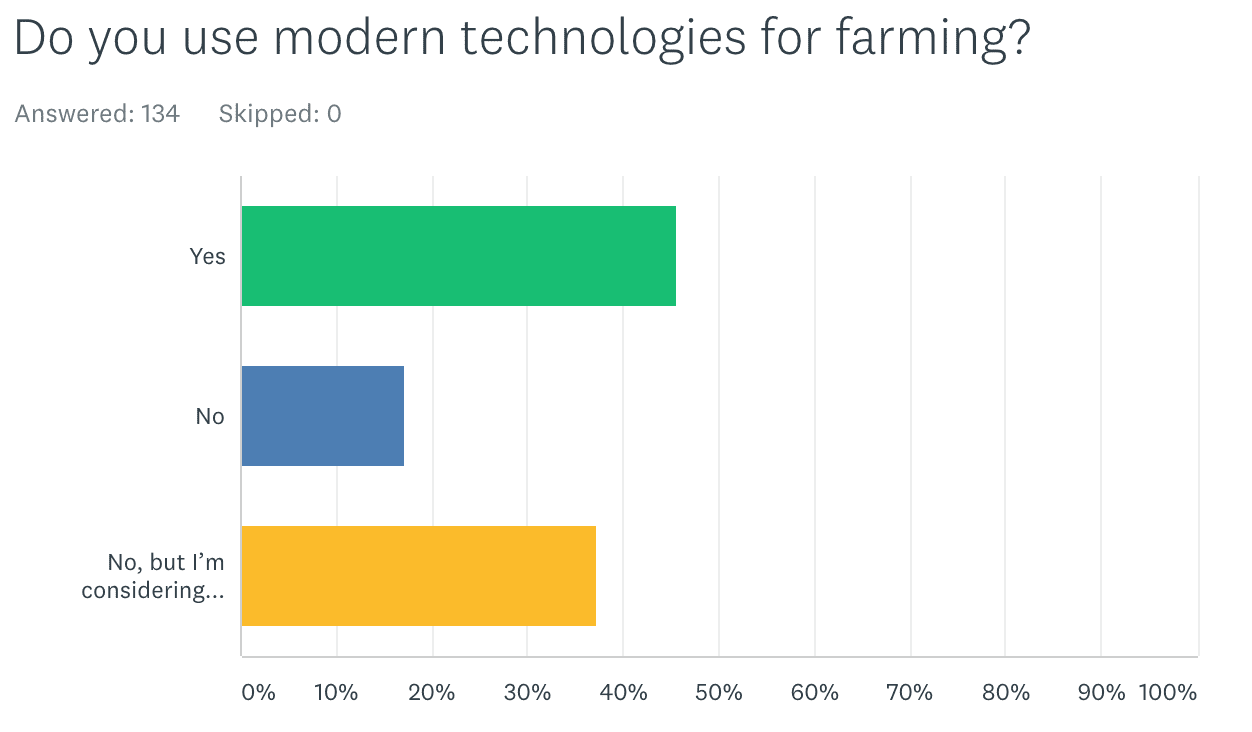
One of the challenges that may be holding farmers back from investing in new technologies, however, is a lack of capital.
Farming Revenue vs. Expenses
Farming is a risky business, and according to our survey, profits are tighter than ever. Over 80% of our respondents earn less than $350,000 on their farm, while just over 7% earn half a million dollars or more per year. Unsurprisingly, many of these same respondents are working to keep their expenses low. Around 84% of survey respondents claimed expenses of less than $200,000 per year.
Farmers thinking of switching to hemp may be able to increase their earnings per acre, but they’ll have to overcome a variety of expenses first. It costs money to invest in a new crop. Farmers must think about things such as new equipment needs, irrigation, soil management, and even the cost of high-quality hemp seeds. We always recommend that farmers take the time to build out a complete hemp farming plan before making the plunge into growing hemp. It’s also a good idea to plant only a few acres or even just a single acre for your first harvest.
How Are Farmers Faring During COVID-19?
Farmers are used to a little unpredictability in each season, but the coronavirus pandemic and ensuing economic challenges are about as unpredictable as they come. With just about every aspect of normal life turned upside-down, including consumer behavior, how are farmers absorbing all of the coronavirus fallout?
For the most part, it turns out they’re absorbing it pretty well! The majority of our respondents (54%) claimed that the pandemic and economic upheaval haven’t affected their farming business much at all. A surprising 27% of respondents even told us that their business was doing better this year, while 19% of respondents are struggling more this year than last.
What Is Holding Farmers Back from Growing Hemp?
Almost every non-hemp farmer we surveyed told us they might consider farming hemp (or already were considering it). We can understand their hesitation. The hemp industry is still finding its footing; after all, it was illegal to grow hemp in the United States for decades!
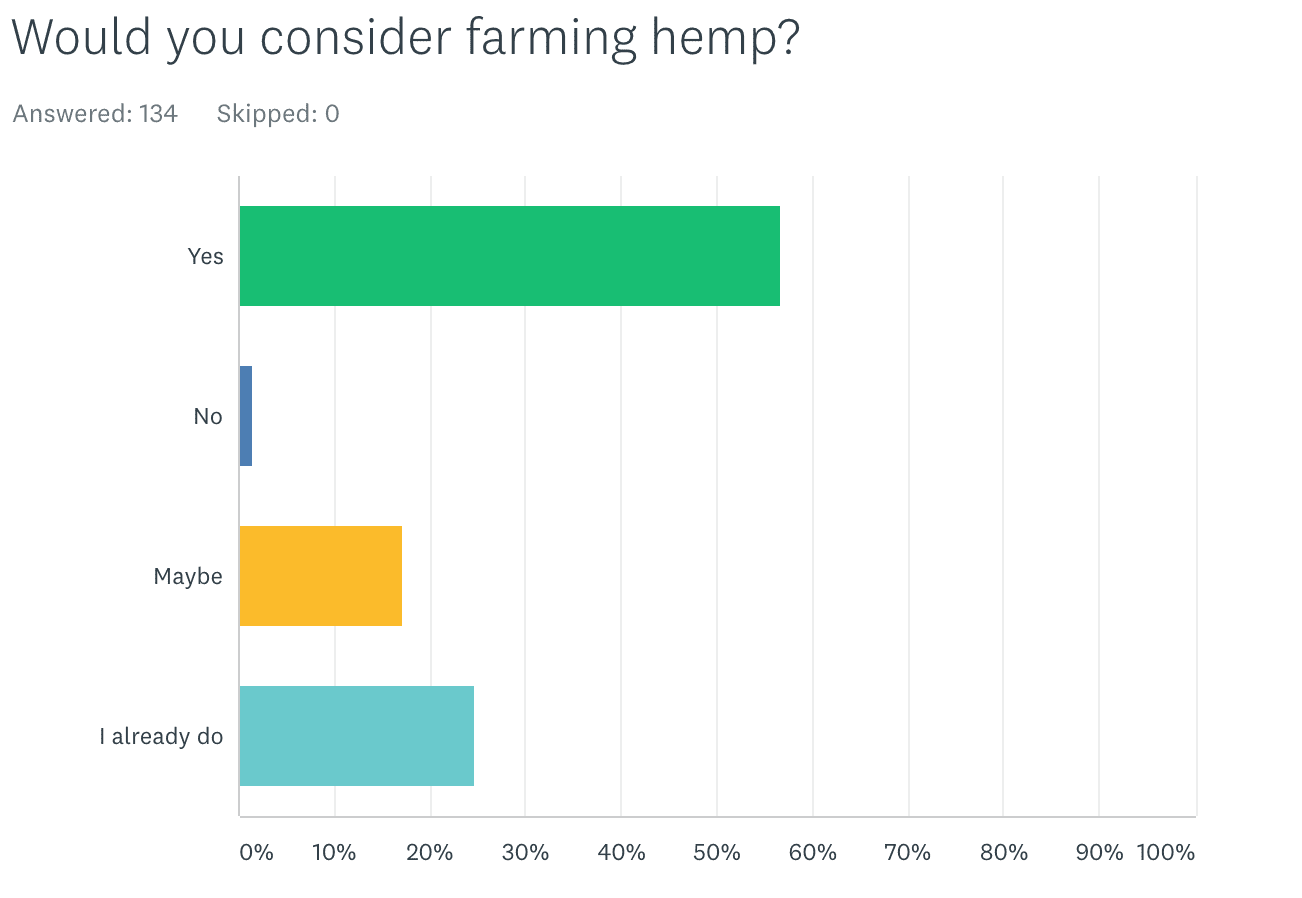
We learned that farmers have a wide range of concerns surrounding growing hemp. The most common concern was the market uncertainty surrounding hemp. The intense interest in CBD and its fellow cannabinoid, CBG, is still relatively new, but as scientific research on CBD and CBG continues to come out, we believe this interest will only grow.
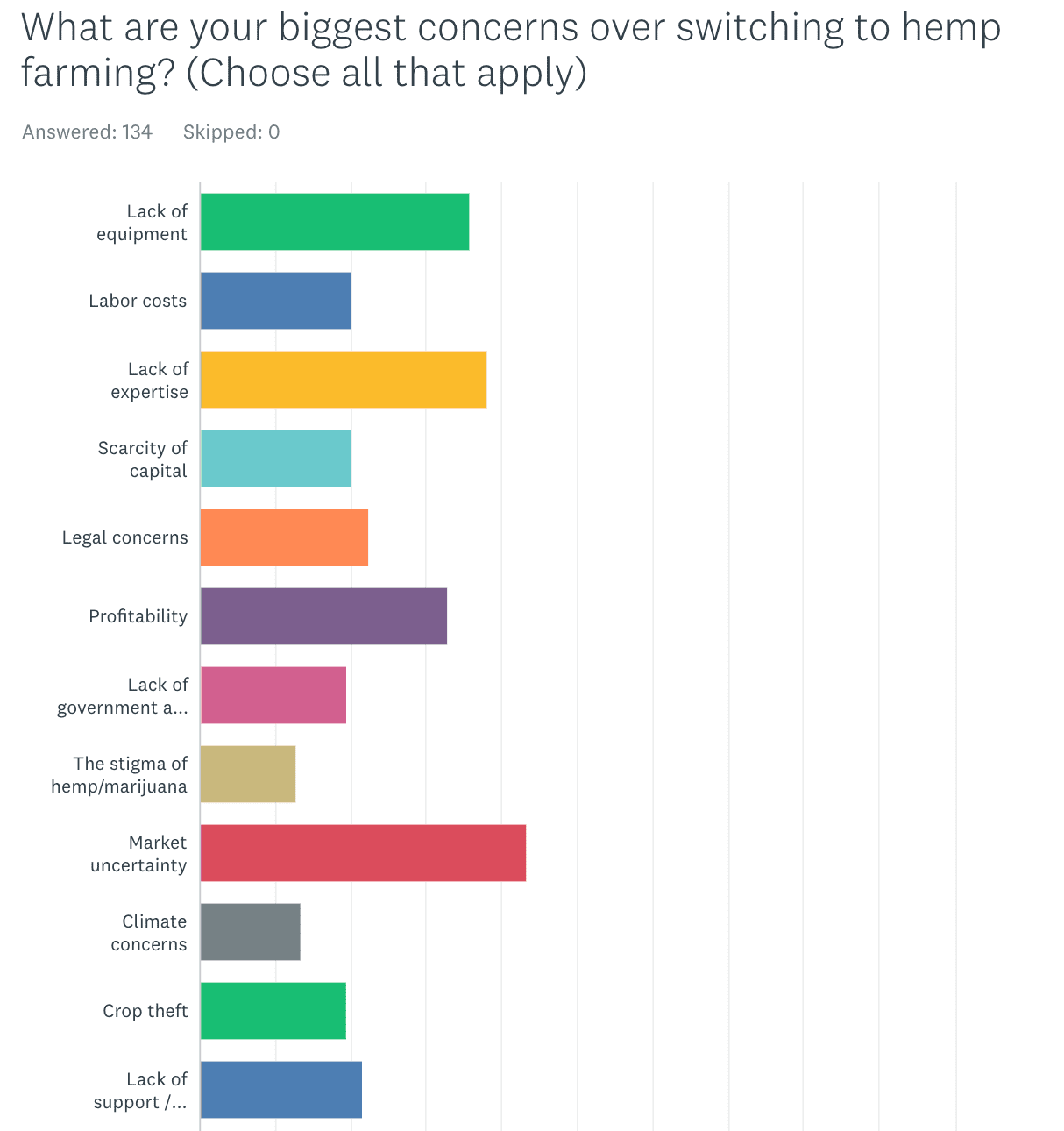 Two other major concerns our survey respondents noted was a lack of equipment and expertise. Many hemp farmers are still learning how to adapt their farming equipment to use on hemp (for reference, we actually wrote an entire article on hemp farming equipment). Farm equipment companies have been slow to develop equipment specifically for hemp farming, but we are seeing more and more CBD-specific hemp harvesters.
Two other major concerns our survey respondents noted was a lack of equipment and expertise. Many hemp farmers are still learning how to adapt their farming equipment to use on hemp (for reference, we actually wrote an entire article on hemp farming equipment). Farm equipment companies have been slow to develop equipment specifically for hemp farming, but we are seeing more and more CBD-specific hemp harvesters.
The lack of expertise in growing hemp is also a challenge that will ease over time. Even now, more and more agricultural organizations and hemp farmers are sharing their experiences and the results of their tests and experiments. Before planting hemp, it’s a good idea to seek information from the agricultural department in your state, reach out to fellow hemp farmers in your area, and consider hiring an agronomist with experience in hemp farming.
If you have any questions about which hemp seed strains to use on your farm, we hope you’ll contact us. Our friendly and knowledgeable representatives are happy to answer your questions and to find the best hemp seeds for your goals, budget, and climate.
